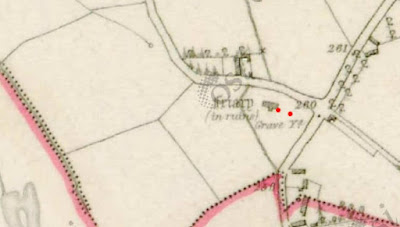Kilmainham Friary in Laois
Kilmanman in Laois I hear you say - No, it's Kilmainham in Laois.
Saint Manman is associated with Clonaslee and Kilmanman in Laois however this post is concerned with the townland of Kilmainham and its obscure, overgrown and unloved antiquity.
It is located about 1.5 Kms East-southeast of Mountmellick. At this location lie what are presumed to be the remains of a late medieval Friary.
The lamentably neglected Friary is hugely overgrown with decades worth of trees and Ivy destroying what remains of a once flourishing establishment.
The building is marked on historic 1800's mapping as a Friary and is described in that century as "in ruin". It's quite likely that the Friary and its lands were seized at some time in the past.
There is a graveyard at the Friary but it is described as having no upstanding grave markers. It is in such a state of neglect that I should imagine were it cleared out and cleaned up markers would become visible.
It's very sad to see such important and historic buildings left to rot. I can only presume that it is left in such a state in hope that it falls down and disappears altogether thereby joining an increasingly long list of missing or destroyed Laois antiquities.
Friars are mendicants and chiefly relied on donations from the community and it's leaders or chiefs. Unlike Monks they didn't remain within the walls of their Church or Abbey. They often travelled about spreading and preaching the word of God.
Like Monks most are un-ordained and do not hold Holy Orders but not all. Usually an Abbot or Prior who heads a congregation, Abbey or Priory must hold Holy Orders.
The Friar's are often referred to by the colour of their Habits such as Grey Friars, Black Friars or White Friars etc.
Carmelites, Franciscans, Dominicans and Augustinians are some of the more well known religious orders of Friars working in Ireland.
An obscure but interesting order is the Fratres Cruciferi known in English as the "Crutched Friars".
They were a little known order of Friars and were called such because of the crooked wooden Staff that looked like a Crutch which they carried as they walked from place to place.
They were known in Ireland at Dublin and at Nenagh in Tipperary among other places. The Cruciferi were associated with hospitals and healing. The order disappeared many centuries ago.
There seems to be no information available as to which order of Friars was established at Kilmainham but despite the lack of information the building still stands as testament to an ecclesiastical tradition here dating back many centuries.
It's also possible the present building is a later medieval Church erected on the site of the original Friary but the 1800's mapping and references suggest otherwise.
The Friary as of 2021 had a partially intact vaulted roof, some steps and quite a lot of upstanding stone walling. It remains to be seen just how much of it survives for future generations to see.
My penultimate photograph is of the complete Friary. It shows the building completely overgrown and almost impossible to see at all, such is the condition of its continued dereliction.
Finally there is an old Black and White photograph of a man standing beside the building from Canon O'Hanlon's History of the Queen's County.
Coordinates here :
53°06'32.2"N 7°17'10.3"W
53.108951 - 7.286204
Screenshot below of Griffiths Valuations/ Occupiers :
Screenshot of some 1911 Census Results at the National Archives for Queen's County :
Dated 1550, William Hydney of Kilmainham Laois listed as a Gentleman - Screenshot taken from Carlow IGP.
Schools Collection- Local Ruins - dúchas.ie
Schools Collection - In Penal Times - dúchas.ie
Griffiths Valuation _ Kilmuyman/Kilmainham
.jpg)
.jpg)
.jpg)
.jpg)
.jpg)
.jpg)


.jpg)
.jpg)
.jpg)
.jpg)
.jpg)
.jpg)


